
_Maureen Dunne is a freshman journalism major at MU. She is an opinion columnist who writes about student life for The Maneater._
The last thing I wanted to be told during my first month of college is that I am “talented.” Yet, after taking the mandatory CliftonStrengths for Students personality test, I and the other 499 freshmen in my J-1010 class were not only informed of our individual “talents,” but also told to build upon them for our career and major interests. I was horrified! Although the results of the test were intended to empower us, its wording seemed to constrain each person to only having certain preexisting “talents.”
The way in which the results of the CliftonStrengths test are presented is extremely important because it can affect the way individuals view themselves and their abilities.
The wording of the CliftonStrengths test results are dangerous because they minimize the impact of hard work by referring to one’s developed skills and personality traits as inherent “talents.” This implies that every skill a person has developed over the course of his or her lifetime was inherent, thereby negating its actual source: the continued effort put into the development of that skill.
The word “talent” has certain connotations, none of which are constructive. Defined as the “natural endowments of a person,” it is most commonly used to mislabel many developed skills and abilities.
For example, professional athletes are often described as being “talented,” although a more appropriate description would be “hard-working.” Michael Jordan, one of the best basketball players in the history of the NBA, did not make the varsity basketball team his sophomore year of high school.
He hadn’t yet developed the skills he needed to rise to that team yet, but wasted no time practicing and working to develop them. Basketball didn’t come naturally to him, but through thousands of hours of practice, he became the athlete he is revered as today.
Had Michael Jordan believed that he had an unchangeable amount of ability, would he have seen the value in doing the work to get him where he is today?
Labeling hard-earned skills as “talents” is damaging because it minimizes the power of potential, practice and effort and instead promotes the false notion that humans are born with a certain set of unchangeable skills or intelligence.
In his “Essay Concerning Human Understanding,” philosopher John Locke asserts that every human being is born into the world with a blank mind, or tabula rasa, which is then imprinted upon by learning and experience. It makes sense: no baby is born knowing how to speak, walk or play basketball, but develops these abilities over a lifetime.
Why do we then think of ourselves or others as having natural abilities when we all started out in this world not knowing anything?
Thinking that people are born with inherent abilities is extremely damaging. Telling children they have innate talent instead of acknowledging the effort taken to develop those skills has damaging consequences down the road according to decades of research conducted by Carol Dweck, a psychologist at Stanford University.
Children constantly praised as smart or talented grow up believing that they have a fixed amount of skill, whereas children praised as hard workers are given a recipe for success and are able to apply it to many areas of their lives.
Children praised for their effort develop a growth mindset. From an early age, they are more adaptable to learning and know that hard work can fix future challenges they may face. However, children raised thinking they have inherent talents are victims of the fixed mindset. People with a fixed mindset believe that learning and effort contribute nothing to achievement and fear learning and growth. As established by Dweck’s research, people with a growth mindset are more adaptable and are more successful later in life than those with a fixed mindset.
Just like in infancy, freshmen are again entering a whole new world and period of rapid growth and development. Again, our minds are tabula rasas, and instead of relying on the false and limiting notion of preexisting “talent” for this new beginning, we need to focus on our potential to develop new abilities just as we have developed the ones we have gathered thus far.
However, the CliftonStrengths test has an opportunity to be a valuable tool to increase self awareness and personal growth. The test should be outlining our capabilities to grow and improve every aspect of ourselves: to empower our potential and not box us in with “talents” we have previously developed. Rather than referring to learned abilities as “talents,” the test results should provide recognition for the effort behind each of these developed abilities to foster a growth mindset and provide inspiration to develop further abilities.
This new period in our lives should be faced without false notions of inherent “talents,” but armed with the comfort of being able to develop new skills and improve the old ones. You have much more potential than your CliftonStrengths test results let on. Don’t be afraid to work hard and use it.